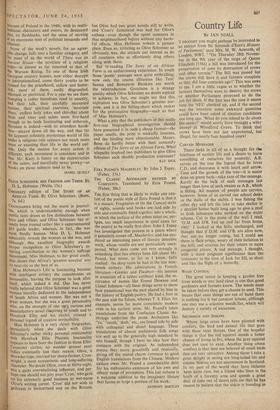EZRA POUND'S MAQBERLEY. By John J. Espey. (Faber, 15s.) THE
CLASSIC ANTHOLOGY DEFINED BY CONFUCIUS. Translated by Ezra Pound. (Faber, 30s.) THE first thing that is likely to strike any ana- lyst of the poetic style of Ezra Pound is that it is a mosaic. Fragments or (in the Cantos) slabs of sights, sOunds and books are laid side by side and eventually fitted together into a whole, in which the surface of the Nem takes on, per- hAps, too much importance in most cases for the poetry to be really first class. John J. Espe,y has investigated this process in a poem where it genuinely comes off, Mauberley, and has pro- duced an interesting piece of literary detective work, whose results arc not particularly unex- pected. What does come out very strongly is something that has always been felt about Mr. Pound, but never, as far as I know, fully studied : the deep roots he had in the late nine- teenth century. His admirations in French literature—Gautier and Flaubert—his interest in eroticism of a rather artificial kind, the re- currence of names like Ernest Dowson and Lionel Johnson—all these things serve to show how transitional was the part played by him in the history of English poetry. He had a foot in the past and the future, whereas T. S. Eliot, for example, seems far more completely modern even in his earliest verse. Mr. Pound's latest translations from the Confucian 'Classic An- thology underline the point. Archaisms like "tis,' "neath,"doth,' etc., are found side by side with colloquial and direct language. These translations of almost prehistoric folk songs are well up to the generally high standard he sets himself, though I have no idea how they compare with the original. As independent poems they move gracefully and musically. giving off the muted charm common to good English translations from the Chinese. Moilern culture owes Mr. Pound a considerable debt for his enthusiastic- extension of his own and others' range of perception. This last volume is a welcome addition to the imaginary library that forms so large a portion of his work.
ANTHONY HARTLEY

















































 Previous page
Previous page